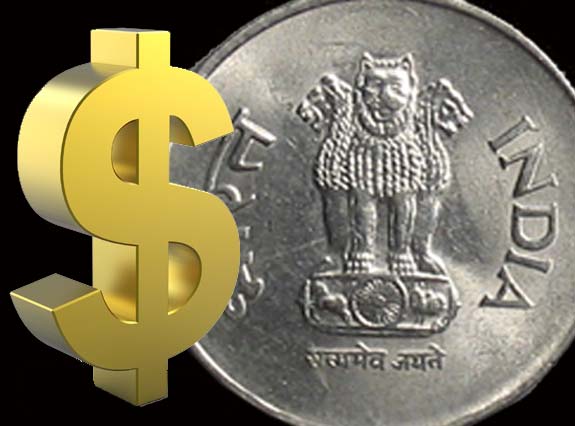ITALIAN SIROCCO MELTS INDIAN RUPEE
Wages of Living Beyond Means
– Ram Kumar Ohri, IPS (Retd)
Yesterday on August 28, 2013, the Indian Rupee touched a new low. It breached the giddy downslide of Rs. 68 to a dollar and closed at Rs. 68.80 Paise. The British pound was traded around Rs. 103. Since May 2013 the Indian rupee has fallen by 20 percent which is believed to be the steepest decline ever recorded in a short span of three months. Meanwhile, industrial production during the last quarter has gone down to minus 2 percent, while the job market has shrunk enormously. No new jobs are being created and even those already employed live in the fear of receiving pink slips! Share market has plummeted to a new low and investors have lost millions of rupees. In one single day, i.e., on August 27, 2013, the foreign investors sold shares worth one billion rupees. By all accounts the rupee is headed towards further fall to the level of Rs. 70 per dollar. The Prime Minister is dumb-struck and discomfiture of the country’s clueless Finance Minister is writ large on his forehead. There are pessimists in India’s financial market who anticipate rupee’s fall to Rs. 75-80 per dollar before Diwali. Meanwhile in this gloomy weather the speculators and punters are busy merry-making.
The analysts of BNP Paribas, a renowned France-based group of financial experts, were quick to reduce the estimated GDP growth of India from the previous estimate of 5.2% to a meagre 3.7 percent for the financial year ending March 2014. It will be the lowest GDP growth recorded since 1992. According to informed sources, our foreign exchange reserves have depleted so fast that now we have foreign exchange in kitty which can meet the cost imports barely for six months. It may be recalled that at the time of economic crisis of 1992 the country’s foreign exchange was good enough to meet the requirements of two months import bill.
The painful narrative of the limitless melting of Rupee is a long story which can be analysed and summed up only by professional economists. Prima facie the Italian sirocco has hit India very hard. Its heat and fury has taken an exceptionally heavy toll of Indian economy. The singeing of economic growth caused by reckless splurging of funds, ostensibly on advice of the National Advisory Council led by Sonia Gandhi, has led to a dramatic decline in investments by international as well as Indian entrepreneurs. The reasons are well known. One important reason was massive corruption brought to the notice of public by the Comptroller & Auditor General, Vinod Rai.
Apart from an exceptionally high Current Account Deficit of more than 88 billion dollars which comes to a staggering 5.2 percent of the GDP, the last few years have seen a quantum jump in fiscal deficit. According to the latest data for the quarter ending April-June, 2013, India’s fiscal deficit stood at the abnormally high level of 43.7 billion dollars. In percentage terms it comes to more than 5 percent of our GDP which is very high. Ideally the country’s fiscal deficit should have been limited to 3 percent, as envisaged in the Financial Reponsibility Act of 2004. The Sonia-sponsored Food Security Bill is likely push up the fiscal deficit further. It can lead to spiraling inflation which might become unmanageable. It is a well known fact that in every country, every economy, the fiscal deficit is met by printing additional currency notes ! The resultant high inflation and fall in production leads to a crisis situation in which price rise become endemic and uncontrollable – a situation which presently stares us in face.
The first damage to Indian economy was done by the notoriously famous Mahatma Gandhi National Rural Employment Guarantee Scheme (popularly called MNREGA) launched in February, 2006. On a rough count doles worth approximately $ 40-50 billions were pumped into the financial system during the last seven years. Everyone knows that MNREGA is a big ticket money-leaking scheme. Undoubtedly the scheme was a grand success as a vote-catcher Soon this bucketful of half-baked welfare scheme was followed by the introduction of a number of money-leaking schemes, launched as welfare measures. On top of it the UPA government has passed the financially controversial law call Food Security Bill which is likely to impose an additional burden of Rs.1.50 lakh crores on the nation’s battered exchequer. For getting out of this financial mess created by Italian sirocco two options are available. The first option available to the Finance Minster is to go to the International Monetary Fund for succour. The second available option could be to impose financial emergency under Article 360 of the Indian Constitution. The latter option might cause more confusion and distress to the public – at least temporarily.
The panic caused by the ongoing economic fiasco is so widespread that all kinds of jokes are afloat on social media – some printable, others unprintable. One such jokes says that time has come to check up whether the degrees in economics held by Dr. Manmohan Singh and Montek Singh Ahluwalia, two celebrated economists, need to be checked to ascertain whether these are forged or genuine.

